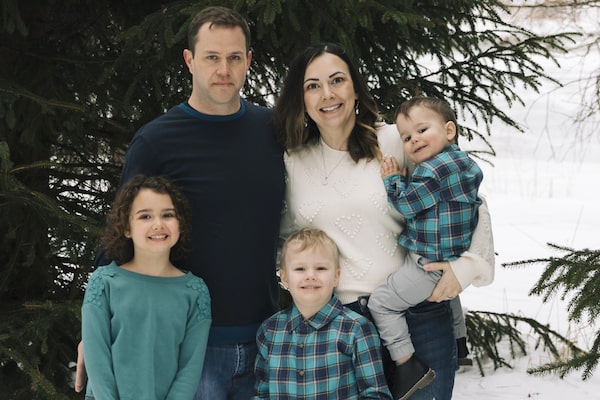
Alanna McDonald, of St. John's, says she had this family photo taken in February, shortly after her family doctor found a tumour in her brain.HO/The Canadian Press
A woman in Newfoundland says she waited a year for an MRI scan that ultimately revealed her blinding migraines were caused by a tumour pressing into her brain.
Alanna McDonald said if she had been able to get a scan sooner, she could have avoided a planned 16-hour brain surgery that will cause her to lose hearing in her left ear and possibly paralyze part of her face.
“Our system is broken. It’s taken so, so long,” the 42-year-old chiropractor said in an interview from her home in St. John’s, N.L. “I still would not be diagnosed if I hadn’t pushed, if my doctor hadn’t said, ‘Call and push and see if you can get in earlier.’”
Her symptoms began about two years ago, with sudden bursts of kaleidoscopic vision. That quickly progressed to debilitating migraines and numbness in parts of her face, she said. She saw an optometrist, then a dentist because she thought the incredible pain in her head might be from grinding her teeth.
Nothing seemed to help. By the summer of 2022, McDonald said, her family doctor knew she needed an MRI, which is a type of scan that can produce images of organs.
But in Newfoundland and Labrador, family doctors can’t request MRIs. In some other provinces, including Nova Scotia and Ontario, they can.
So McDonald had to wait for an appointment with an ear, nose and throat specialist to get on the wait-list for a scan. She was put on the list in January 2023 and told she could be waiting up to two years. In the meantime, her symptoms got worse.
“I would get super dizzy, super nauseous,” McDonald said.
She has three young children: a two-year-old, a five-year-old and a seven-year-old. “My husband works away half the year, so I will be like messaging him, desperate, like, ‘I’m so sick. I can’t deal with this.’”
Her family doctor began encouraging her to call regularly to see if an earlier appointment for an MRI opened up. Finally, she got one on Jan. 22, she said.
Two days later, with the scan in hand, her family doctor told her she had a three-centimetre-wide tumour on her brain, called an acoustic neuroma. Though it’s likely benign, she has to travel to Halifax later this month for an operation that will take up to 16 hours and leave her without hearing in her left ear. It could also leave her without feeling or with paralysis in parts of her face.
The tumour is lodged within a sheath covering a nerve, she said, and the surgeon will have to go into her skull from behind her ear to get at it. If the mass had been found when it was smaller, she could have qualified for less invasive procedures with fewer risks.
McDonald said she had family photos taken within two weeks of her diagnosis, in case she never looks the same again. “Everyone’s trying to be super strong. My husband has been super stressed out,” she said. “I know the kids are feeling it.”
Data from the Canadian Institute for Health Information shows the median wait for an MRI scan in Canada in 2022 was 41 days. One in 10 patients waited 160 days.
Newfoundland and Labrador, along with Quebec and New Brunswick, did not provide data. Of the seven provinces that did, Manitoba had the longest median wait time at 99 days. One in 10 patients in Nova Scotia waited 348 days. McDonald’s wait of more than a year was about nine times longer than the national median.
Newfoundland and Labrador’s health minister said that after McDonald shared her story, he asked the provincial health authority to examine whether it needs another MRI machine. A new machine will become operational in July when a new hospital opens in Corner Brook, N.L., increasing capacity across the province by about 20 per cent, he said in an interview.
The provincial heath authority is also aiming to boost the number of hours MRIs operate each day, and it’s working on a centralized wait-list for medical scans so patients can take advantage of cancelled appointments anywhere in the province, he said.
McDonald noted that the province is struggling with a shortage of health-care workers, and she wonders whether facilities will find the staff to fulfil these plans. “You can make all the promises you want,” she said. “Until I actually see that come through, I don’t believe it.”